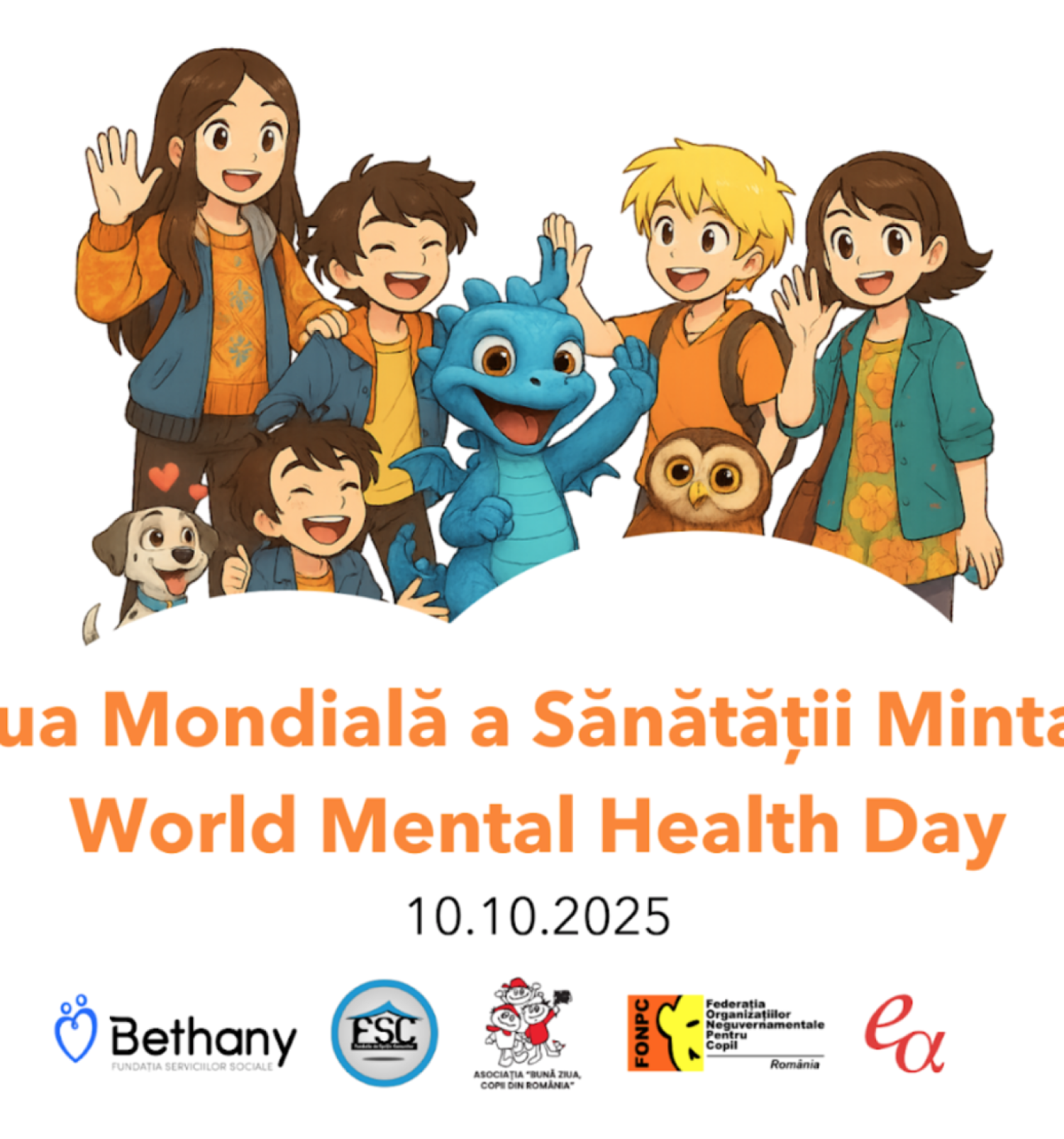World Mental Health Day – The EMBRACE Future Project Team Raises Awareness of Children’s Psychological and Emotional Well-Being
On October 10, 2025, the EMBRACE team joins the global community to mark World Mental Health Day with a powerful message: mental health matters for everyone.
Mental health is the inner balance that allows us to understand our emotions, manage stress, adapt to change, and build healthy relationships with others.
Every day, three adolescents in Europe lose their lives due to mental health issues, and half of all mental disorders appear before the age of 15 (UNICEF).
Romania ranks among the last EU member states in terms of children’s well-being and quality of life. The gaps are visible and painful, especially for children and young people from vulnerable backgrounds who face deep social difficulties. Lack of resources, family instability, and limited access to support services contribute to emotional imbalances and poor mental health. In fact, 33% of children aged 11 to 15 report feeling sad more than once a week, compared to an average of 13% across 45 countries in a WHO study (WHO “The State of World’s Children”). Without true emotional support in schools and communities, we risk losing entire generations who, above all, need to be heard and understood.
In Romania, many children struggle with mental health disorders: behavioral issues, anxiety, depression, or autism spectrum conditions affect their daily lives. Alarmingly, more than 40% of newly diagnosed children with autism live in rural areas with no access to therapy or specialized support. These children often remain unheard and misunderstood, even though their need for help is urgent and real.
Given the considerable time children spend in schools, they should be the place where they feel safe, supported, and motivated to learn. The reality, however, is different: about 1 in 4 middle school students face emotional problems – fatigue, anxiety, sadness – that affect their daily lives. These symptoms reflect ongoing difficulties in managing emotions in Romanian schools, which lack a coherent framework for supporting mental health. Resources are limited and unevenly distributed, existing initiatives are isolated, and there is no integrated national program. School counselors, though present in most schools, are too few in number compared to actual needs, have low visibility, and are rarely seen by students as a real source of support (UNICEF). As a result, many children are left alone with their emotions, without the help they desperately need.
At present, Romania does not have an updated national strategy for children’s mental health – the last one covered 2016–2020. This gap leaves the field underdeveloped in schools, fragmented, and inconsistent, with huge consequences for today’s and tomorrow’s youth.
Children’s and adolescents’ mental health is not just a concept – it is the foundation on which they build confidence, courage, and their future. When we offer them support, listening, and an environment that respects their emotions, we help them grow stronger and more resilient in facing life’s challenges. Investing in their well-being means giving them the chance at a happy childhood, access to education, and a life full of opportunities—because every child deserves to be heard and understood.
To mark #WorldMentalHealthDay, the EMBRACE project team highlights the importance of emotional well-being through key messages for professionals working with children and youth, as well as resources designed to educate and inspire. Maya and Leo, the beloved EMBRACE characters, reflect what many young people feel: the weight of overload and pressure. By taking a step back, grounding themselves, and reconnecting with one another, they discover how simple actions can transform stress into strength. The video encourages young people to recognize their emotions and to seek support when needed: .
This global day is part of the wider “#KnowEmotions” campaign, running from October 2025 to April 2026 within the EMBRACE project. The campaign’s main goal is to promote emotional literacy and build resilience among children and youth. Professionals are invited to explore the campaign’s key messages in “EMBRACE – World Mental Health Day”, which emphasize emotional well-being, the power of authentic dialogue and active listening, and an open call to join the #KnowEmotions movement.
EMBRACE is a European initiative dedicated to promoting children’s mental health through education, awareness, and innovative tools for teachers, parents, and policymakers. The project addresses mental health challenges faced by vulnerable children in disadvantaged rural areas and small towns in northeastern Romania, through an intervention model already piloted in 10 schools. In the project, 500 children take part in EMBRACE workshops over nine months, accessing resources, including digital tools, that will be promoted nationally and across Europe to support children’s mental health. The program is built around five modules:
- My physical health and safety – the foundation of well-being
- Cognitive well-being
- I’m okay with my emotions
- Spiritual well-being – values and beliefs
- Social well-being
The project supports not only children but also parents and teachers, creating a model of intervention that can transform schools into safe, supportive spaces for the emotional health of all children.
The public is encouraged to follow EMBRACE activities online and help spread the message of World Mental Health Day 2025.
Follow EMBRACE on LinkedIn | Facebook | Instagram | X | YouTube
The project builds on local expertise through a consortium of experienced partners – Fundatia Serviciilor Sociale Bethany (FSSB), Fundatia de Sprijin Comunitar (FSC), Asociatia “Bună Ziua, Copii din România”` (BZRO) – three local organizations specialized in child protection, social, and educational services, Federatia Organizatiilor Neguvernamentale pentru Copil (FONPC) – a federation specialized in advocacy and children’s rights Evolutionary Archetypes Consulting SL (EAC) – the transnational partner with extensive expertise in innovative communication.
All of this is supported by local authorities, schools, and social and educational professionals at local, regional, and national levels.



